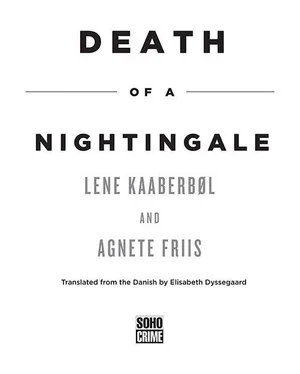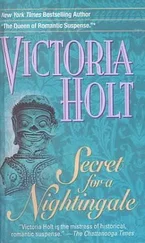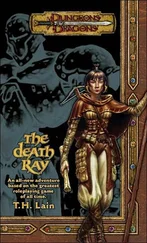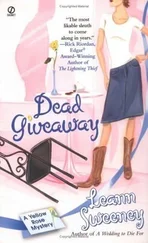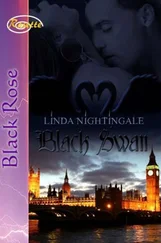Lene Kaaberbol - Death of a Nightingale
Здесь есть возможность читать онлайн «Lene Kaaberbol - Death of a Nightingale» весь текст электронной книги совершенно бесплатно (целиком полную версию без сокращений). В некоторых случаях можно слушать аудио, скачать через торрент в формате fb2 и присутствует краткое содержание. Год выпуска: 2013, ISBN: 2013, Издательство: Soho Crime, Жанр: Старинная литература, на английском языке. Описание произведения, (предисловие) а так же отзывы посетителей доступны на портале библиотеки ЛибКат.
- Название:Death of a Nightingale
- Автор:
- Издательство:Soho Crime
- Жанр:
- Год:2013
- ISBN:1616953047
- Рейтинг книги:5 / 5. Голосов: 1
-
Избранное:Добавить в избранное
- Отзывы:
-
Ваша оценка:
- 100
- 1
- 2
- 3
- 4
- 5
Death of a Nightingale: краткое содержание, описание и аннотация
Предлагаем к чтению аннотацию, описание, краткое содержание или предисловие (зависит от того, что написал сам автор книги «Death of a Nightingale»). Если вы не нашли необходимую информацию о книге — напишите в комментариях, мы постараемся отыскать её.
Death of a Nightingale — читать онлайн бесплатно полную книгу (весь текст) целиком
Ниже представлен текст книги, разбитый по страницам. Система сохранения места последней прочитанной страницы, позволяет с удобством читать онлайн бесплатно книгу «Death of a Nightingale», без необходимости каждый раз заново искать на чём Вы остановились. Поставьте закладку, и сможете в любой момент перейти на страницу, на которой закончили чтение.
Интервал:
Закладка:
Maybe it was like the rent—Pavel didn’t have to play by the same rules as everyone else.
All at once she realized there was a link to some of the pictures in the little camera. She wasn’t sure what it meant, but there was a connection. Two pictures showed a little old lady. In one a large man in an overcoat was helping her out of an even larger car. In the other she stood smiling broadly up at another man, a man Natasha knew mostly because he had once been on the national soccer team. Nikolaij Filipenko. And the woman holding his face between her hands was his mother, Tetjana Filipenko. Who owned U-card.
“WHO DO YOUcall when you need a bit of cash? U-card, U-card, U-card! You call: zero, eight hundred, four hundred and two hundred twentyyyy.”
She sang the little jingle aloud to herself, as Pavel had done when he flashed his gold card in expensive clothing boutiques and good restaurants. Happy, greedy Pavel who had treated that U-card like a goose who shat golden eggs, golden eggs he never had to pay for.
Natasha turned off the country road she was on and pulled over to the side. She drew the numbers with a finger on the fogged-over car window so she wouldn’t stumble: 0-800-400-220. Then she found Robbie’s cell phone in her pocket and called.
“U-card customer service. How may we help you?” The voice was young and mild and could almost have belonged to one of the scantily clad girls from the commercial. In the background Natasha heard the faint clatter of hundreds of fingers on computer keyboards.
“I would like to speak with Tetjana Filipenko.”
“I’m sorry?”
Natasha waited a moment. “Tell her that Natasha Doroshenko wants to speak with her. Tell her to call me at this number.”
“I think you have the wrong number.” The voice at the other end had developed a sharp edge. “You have called U-card’s customer service. We can block your card if it has been stolen. We can make a transfer for you. We can assist you with your …”
“Do you want to die?”
Natasha’s question stopped the girl’s memorized service patter, and the phone became silent. She could still hear the faint clicking from all the other keyboards and the soft buzz of other young women’s voices in the background. Natasha pictured the young woman, far away in Ukraine, looking around for help. Considering her options. But she was surrounded by young women like herself, and they were all busy blocking U-cards and sending money through cyberspace.
“Tell Tetjana Filipenko that I called, and she should call me at this number. Natasha Doroshenko. Tell her.”
She hung up and remained sitting with the phone in her hand. Closed her eyes and waited. The Witch would call.
UKRAINE, 1935
No one was allowed to see the dead.
Not even Mother, although she screamed and cried herself hoarse in front of the village soviet’s office. Comrade Semienova put her arm around Mother’s shoulders and cried too, but she was still the one who held Mother back and prevented her from storming into the building where the GPUs were busy still. She had to wait until they were done examining the bodies, said Semienova. Nothing was more important right now than finding out what exactly had happened.
Olga stood behind her mother and could not cry, even though a hard, sharp pain had lodged itself just below her breastbone, like it sometimes did when something heavy hit you in the stomach. She couldn’t cry, and she could barely breathe.
They had killed Oxana. That was what Comrade Semienova had told them. Down by the stream, with knives. The attack had been so violent that the blood had sprayed out over the snow and the naked birch branches in an arc several meters wide. That last detail Olga knew from Leda and Jegor, who had gone out with Comrade Semienova to look for Oxana. The first thing they had seen was little Kolja lying on the ground, staring emptily at the sky. His toy rifle was nowhere to be seen. Olga didn’t know why she asked about it at all, but for some reason it felt important. As if the rifle could have made a difference. But he didn’t have anything in his hand, said Leda, and he was dead, she could see that at once because his throat gaped like a broad red extra mouth under his chin.
Oxana had been lying a little farther off.
I want to die too, thought Olga. I want to die and lie together with little Kolja and even with Oxana, because now they no longer feel anything, while I hurt everywhere.
But she didn’t die, and she couldn’t think of anything she might do right now to make death happen. She could only stand there behind Mother and listen to her hoarse screams and look at Comrade Semienova, who had red, swollen eyes. Today she wasn’t showing her dimples or smoking cigarettes.
During the night Mother finally stopped screaming, which was both a relief and a source of new fear, because what if she died of sorrow? Olga knew it was possible, because her own soul felt like it was twisting inside her and attempting to escape her body. Olga had heard that there was no greater sorrow than the one a mother feels when her child dies. And Mother had lost two children at once, and maybe that was more than heart and lungs and intestines and all the other things inside the body could endure.
Olga curled up, listening for Mother’s breath in the darkness. She finally caught the sound, the kind of small, hiccupping gasps that small children sometimes made when they had cried deeply and for a long time. It was impossible to tell if Mother was sleeping or if she was awake. But at least she wasn’t dead. Not yet.
Oxana would never sing again, and Kolja was done playing family and fighting great battles for the Red Army. Now he lay dead in the headquarters of the GPU. Olga suddenly wondered if all the lice on his head would follow him into the ground. The thought nauseated her, but she couldn’t stop herself. Pictures kept popping into her mind, pictures of Kolja with his throat cut and lice that crawled slowly across his cold, pale scalp; of Oxana’s sparklingly happy blue eyes that day when she had learned that she would sing at the Pioneer meeting in Kharkiv.
“You shouldn’t have gone, Oxana,” Olga whispered into the mattress. “I told you not to go.”
In a few quick frames of the footage, Rina slid down from the couch and under the coffee table. It took less than six seconds. Another camera had caught her at the garage and a ways down the sidewalk, a sequence of twenty-one seconds. Both recordings were almost two hours old.
“She’s alone,” said the Cud-Chewer and searched on among the not-an-iPad’s stored pictures. “It’s not a kidnapping.”
“I thought you were watching her,” said Nina. “I thought you were fucking professionals. What good is all that equipment if you can’t even keep track of one little girl? She’s eight, damn it!”
“The camera is set so that it registers ordinary movement in the room. I wasn’t expecting her to worm her way across the floor!”
“Did she see you place the camera?”
The Cud-Chewer was practically chewing his jaw off its hinges. “Maybe,” he admitted. “I thought she was asleep.”
“Why exactly is it that people think she is deaf, blind and dumb just because she doesn’t say very much?” Nina snarled.
Mikael Nielsen didn’t answer. He was making a call, presumably to his boss.
The trick of placing a couch pillow under the comforter so that it looked as if there were still a sleeping girl there—Rina might have picked that up from countless television films. The ruse with the stuffed socks was all her own—it had probably been easier for her than to make than something that looked like a head.
Nina stared blindly out the window at the snowflakes that glittered whitely in the light from the streetlamp. It was freezing out there. Pitch dark. And Rina was alone.
Читать дальшеИнтервал:
Закладка:
Похожие книги на «Death of a Nightingale»
Представляем Вашему вниманию похожие книги на «Death of a Nightingale» списком для выбора. Мы отобрали схожую по названию и смыслу литературу в надежде предоставить читателям больше вариантов отыскать новые, интересные, ещё непрочитанные произведения.
Обсуждение, отзывы о книге «Death of a Nightingale» и просто собственные мнения читателей. Оставьте ваши комментарии, напишите, что Вы думаете о произведении, его смысле или главных героях. Укажите что конкретно понравилось, а что нет, и почему Вы так считаете.
